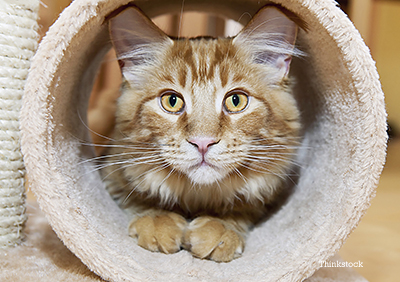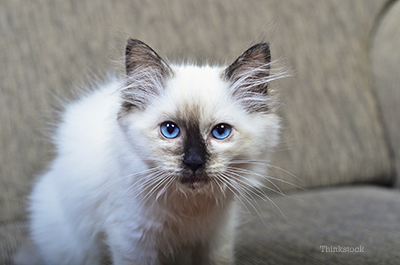
Hypertrophic Cardiomyopathy (HCM), a type of abnormal thickening of the heart, is the most common cause of heart disease in cats. It is often an “occult” silent killer, and it can result in sudden death in cats. HCM is often diagnosed in young to middle-aged male cats. Certain breeds, such as the Maine Coon or Ragdoll, may be predisposed, suggesting a possible genetic component. However, most of the time, the cause of HCM in cats remains unknown.
With HCM, the normal heart muscle is replaced by fibrous connective tissue (scar tissue). This causes the heart to become too muscular (i.e., thicker or “hypertrophied”), and the main heart chamber that pumps blood to the body (left ventricle) becomes too small, making less room for blood. This can result in:
- An abnormally dilated left atrium
- Abnormal blood flow to develop within this part of the heart
With HCM, the fibrous connective tissue doesn’t function like normal heart muscle so the heart does not contract normally; again, this results in less blood being pumped into circulation. Because HCM results in a severely thickened and poorly functioning heart muscle, congestive heart failure, an irregular heart beat (e.g., arrhythmia) and/or life threatening blood clots (commonly called a “saddle thrombus”) can occur, making this disease the most common cause of sudden death in indoor cats.
How HCM hides
Unfortunately, HCM can often go undiagnosed at home. A heart murmur or arrhythmia may be heard on an annual physical exam by your veterinarian and can be the first clinical sign. For this reason, any cat with a heart murmur or arrhythmia should ideally be worked up to rule out underlying heart disease (see “Diagnosis” below).
Symptoms of HCM
Note that not all cats with HCM have heart murmurs that veterinarians can “hear” with the stethoscope. This makes diagnosing the disease very difficult in the early stages. For many cats with HCM, signs consistent with congestive heart failure will be the first indication something is wrong. These sings include:
- Rapid, difficult breathing
- Extreme lethargy
- Collapse
- Life threatening blood clots
Other symptoms include:
- A heart murmur
- Increased respiratory rate (especially after exertion)
- Open-mouth breathing
- Difficulty breathing
- Blue-tinged gums
- Decreased activity
- Decreased appetite
- Weight loss
- Sudden onset of paralysis in hind legs (from a saddle thrombus)
- Weakness or collapse
- Sudden death
 Diagnosing HCM
Diagnosing HCM
In order to diagnose HCM, your veterinarian will probably run the following tests:
- Chest x-rays to look for fluid build-up consistent with congestive heart failure
- Electrocardiogram (ECG) to identify any abnormal heart rhythm
- Blood work to identify any underlying thyroid, kidney or liver disease that may impact treatment
- Blood pressure monitoring
- Echocardiogram — otherwise known as a cardiac ultrasound — to measure the heart size and function
The most important test for diagnosing HCM? The echocardiogram, which lets the cardiologist look at the “inside” of the heart, along with the heart valves. An echocardiogram may be recommended by your veterinarian if HCM or another cardiac disease is suspected based on physical exam findings, clinical signs and chest x-rays. Ideally, this should be done by a board-certified veterinary cardiologist.
Treating HCM
Treatment for HCM may involve hospitalization for several days to treat congestive heart failure, which results in abnormal fluid accumulation in the lungs. Treatment typically includes oxygen therapy, diuretics (e.g., water pills), blood pressure monitoring, and medications to make the heart beat more efficiently.
If the presence of a life threatening blood clot is present, treatment may also include pain medication, platelet medication (e.g., Plavix), aspirin therapy and physical therapy.
Ultimately, the goals for treatment of HCM in cats include:
- Medications to slow the heart rate, correct abnormal heart beats, and improved blood flow and cardiac function
- Medications to decrease blood clot formation
- Medication to alleviate fluid build-up with congestive heart failure
- Diet aimed at minimizing sodium intake and optimizing adequate nutrition for congestive heart failure
- Pain control, if needed
Unfortunately, the prognosis for HCM is based on how well your cat responds to the medication and how advanced the heart disease is. Frequently monitoring and recheck veterinary examinations will be needed to manage cats with HCM and to give them the best quality of life possible. With supportive care and medication, some cats can live with HCM for years. However, it’s important to keep in mind that the heart medication doesn’t treat or cure the heart disease – it only prevents the disease from getting worse or from causing secondary complications.
Questions to ask your veterinarian
- Have chest x-rays or an echocardiogram been performed?
- Is my cat responding to oxygen and diuretics?
- Is my cat is pain?
If you have any questions or concerns, you should always visit or call your veterinarian -- they are your best resource to ensure the health and well-being of your pets.
